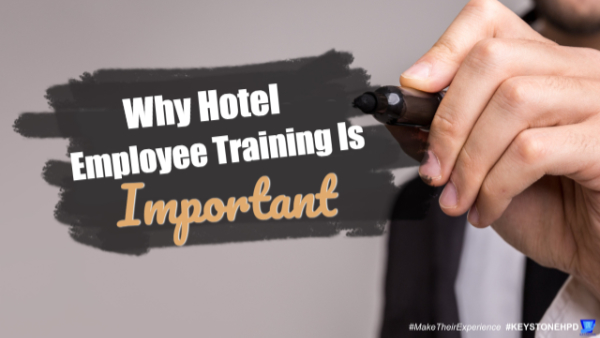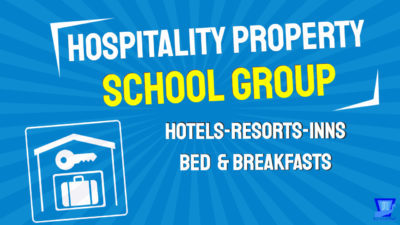Many hospitality properties forgo proper employee training due to associated costs, but studies have shown that the return on investment (ROI) from training and development of employees is a no-brainer.
I’ll explain why hotel employee training is important.
Welcome to another edition of Hospitality Property School.
I am your instructor, Gerry MacPherson.
.
Why Hotel Employee Training is Important
Training can improve employee morale, and business performance, and help increase your profits if you have a properly organized system, you can find the time and I don’t mean just when they are hired, it has to be ongoing.
.
Let me ask you something.
“Do you have a small property, just a couple of employees, but you seem to be doing most of the work?”
or
“Do you have a property running on a shoestring budget, with limited employees that are overworked?”
or
“Are you so busy that you cannot find the time to think about additional training for your employees?”
or
“Do you have high turnover?”
.
If you have answered “yes” to any of these questions, there is no doubt in my mind you’re throwing money out the window and over the years have probably lost some excellent employees.
.
You might be thinking about these questions.
“Why would I want to take on the extra expense?”
“When are we going to find the time? “
“And if I train my employees, won’t they leave for better opportunities?”
Training and upgrading employee skills make good business sense, and that is why hotel employee training is important. It has to start from day one and become continual as your employees grow.
Let’s dig into this a little further. Here are some advantages to training your employees.
• You can choose the training to give your staff
.
• Trained employees will be better equipped to handle customer
.
• You are showing your employees that you value them by investing
.
• Employees that are continually trained feel more stability in their job
.
• Training is an excellent recruiting tool
.
• Training promotes job satisfaction
.
• Trained employees look for the next new challenge
.
• Training adds flexibility and efficiency to your employees
.
• By spreading knowledge around among your employees, you will help save a lot of time and stress if someone suddenly leaves the property
.
• Training gives seasonal workers a reason to return.
.
• When employees acquire new skills, their self-esteem increases
.
• When employees are trained, they stay fresh and motivated
.
Now, it may take some time to see a return on your investment, but the long-term gains associated with employee training make a huge difference down the road.
.
That is a better return than you can get at most banks.
.
Another good reason to invest in your employees is the cost of turnover.
.
Consider the cost of replacing an employee.
.
.
When is a good time to train?
• When performance appraisal shows performance improvement is needed
.
• As part of succession planning to help an employee be prepared for new roles at your property
.
• When testing new systems
.
• As part of an overall professional development program, these could include themes such as:
- Communications
- Diversity
- Computer skills
- Customer service
- Ethics
- Human relations
- Safety
- Sexual harassment
.
Too often, independent hotel or bed and breakfast owners fail to see the value in providing a formal training program. This is where you have to think like a president and not a shareholder.
.
.
Something to keep in mind
Most business owners think they are good leaders by default. Sorry to dissolution you but this is not always the case. Property owners should be trained as well. It is OK to admit you don’t know everything.
.
I had mentioned that all training has to be step-by-step. The reason is that this will be an incredible resource for any new employee and will quicken their success.
.
.
Choose your trainer wisely
It is the trainer’s responsibility to create a safe, non-threatening environment for learning.
.
For this to work, it is crucial that the trainer have great people skills. They have to remember that new employees are people, so it is important to take the time to get to know the new members, establish a relationship, and treat them like they would like to be treated.
.
The trainer has to plan to be patient and set a reasonable pace when teaching new tasks. A good idea is to have them think back to when they were learning something new for the first time. The hectic pace and busy environment will only lead to problems.
.
.
Before a trainer begins
A good trainer will have to understand the material and what’s expected of the employee/employees in their new position.
.
Ask questions to make sure things are clear.
.
When you see things are starting to click, challenge them.
.
The trainer should use current staff as experts, showing how specific procedures actually work in the day-to-day operation.
.
.
Give praise when deserved
Also, criticism is important to correct bad behaviour before it becomes a habit. Make sure it’s constructive and with an alternative solution.
.
Again, I can’t stress enough the importance of step-by-step procedures for all aspects of your business. With the accurate step-by-step process, owners, trainers and new staff will not be second-guessing.
.
Your goal is not only to have employees who can follow the step-by-step procedures for all their tasks, but also be able to think on their feet, and this means all employees on your property.
.
Encourage new employees, in fact, all employees, to seek ideas to make their jobs easier or to enhance your property. Have them be on the lookout for new technology opportunities that you and your employees can explore, even if you’re uncertain if they can be immediately applied to your business. Who knows? You could be onto the next big thing and gain more of an advantage over your competition.
.
.
After training, another training technique to consider:
Job shadowing. This allows an employee to learn about and benefit from the expertise of the senior employees.
.
If an employee has an interest in and expertise in a subject or attends an external training session or conference that could be of benefit to your property, have them hold an in-house training session for all employees. If there are costs involved, you could offer to cost share or pay the entire amount.
.
The first six weeks are essential to any new employee; it’s during this time that they decide whether this is the right job for them. It might be a surprise for you to hear but 33% of hospitality businesses don’t do any training. If this is the case, how on earth do people know what is expected of them on a day-to-day basis, let alone know how they can contribute to the business or develop their careers?
.
Training your staff in the basics of your property puts them in a better position to contribute to cost control and possibly generate income. If people understand how the business makes its money, they are then in a position to contribute to this and put forward their ideas.
.
You can hedge your bet with a well-thought-out step-by-step training process and chisel a new employee into that creative, ambitious worker you so desire.
Here is a fact!
Training gives your employees the chance to grow their knowledge base.
.
Unfortunately, many employers only see the negatives when looking at training opportunities, such as training development opportunities can be expensive or employees might miss out on work time.
.
.
What can happen if you don’t train your employees
- When there is no training, employees might not understand how to do their jobs. This leads to low morale among staff, which causes employee turnover. A property with a reputation for high employee turnover is also unattractive to potential job candidates.
.
- Unskilled employees could spend considerable time seeking help to perform their jobs or they could do the tasks the way they think they should, which could be a disadvantage of the work process. This could result in a low rate of production.
.
- Supervisors and more experienced employees would have to spend more of their valuable time checking unskilled workers.
.
- Untrained workers are more vulnerable to injuries.
.
- A hospitality property that does not train its staff can expect a boost in miscellaneous expenses. These could include reimbursement of unsatisfied guests or the cost of medical attention for staff because of injuries sustained from unskilled use of equipment and supplies.
.
- Untrained employees will result in dissatisfied customers that will not return.
.
The good news is that if an employer steps back, they might see that training and development can provide both, the hospitality property as a whole and the individual employees, with benefits that make the cost and time a worthwhile investment. That is why hotel employee training is important.
- If the training is well-thought-out, relevant to employees’ jobs and presented professionally, businesses are more likely to retain great employees.
.
- Training can show employees that you consider them valuable, relieve stress and tension resulting from turnover, and improve declining employee morale and the decreased productivity that results from a high loss of employees.
.
- Almost all employees have some weaknesses in their workplace skills. A training program can allow those skills to be strengthened.
.
- Training can help reduce any weak links in your business that rely heavily on others to complete basic work tasks. A good program brings all employees to a higher level, so they all have similar skills and knowledge.
.
- With the necessary training, you can create a team with overall knowledge who can take over for one another as needed.
.
- You will have employees that can work independently without constant help and supervision from others.
.
- Your employees can contribute to the success of your hospitality property when they are trained to perform their jobs according to industry standards.
.
- Trained employees are interested in performing their jobs well to advance the company, feel a sense of pride for a job well done and advance to higher positions.
.
- An employee becomes more aware of safety practices and proper procedures for basic tasks.
.
- The training may also build the employee’s confidence because they have a stronger understanding of the hospitality industry and the responsibilities of their job.
.
- Competent employees help your hospitality property hold a position as a leader and strong competitor within your region.
.
- Hospitality properties can reap the benefits of providing training for their employees because well-trained workers help increase productivity and profits.
.
- Keeping well-trained employees pays off significantly for hospitality properties because the cost of employee turnover can be high.
.
.
The importance of consistency
A consistent, structured training and development program ensures that employees have reliable experience and background knowledge. All employees need to be aware of the company’s basic policies and procedures within the property. Putting all employees through regular training in these areas ensures that all staff members at least have exposure to the information.
.
It will also be proven that job satisfaction generally increases and self-esteem improves when trained employees better understand the workings of the business. Training can also enhance morale on the job and loyalty to the company.
.
.
The importance of a structured training program
When designing a training program, there are a few things that have to be taken into consideration:
- A structured training program has a clearly detailed schedule
.
- Timeframe
.
- Outline of activities with well-defined goals and consequences
.
- Assignment of responsibilities
.
Having a structured training program usually leads to more success and employee development than an informal or unstructured one. Without a clear structure, some companies cut corners or fail to complete training processes thoroughly.
.
The structure of a training program also increases your ability to provide a consistent and high-quality training experience for employees. This ensures that each employee starts with a similar opportunity to learn the key aspects of their job.
.
Structure means certainty. You can be certain about the quality and impact of the training provided, at least to the extent they trust trainers to perform their duties. It will not take long before you know how many days or hours you need to assign to training for each role. This makes budgeting for training more effective.
.
.
How to set up a training program
You have to look at training as an investment in your property and staff that will provide lasting returns in productivity and profits, but only if it is well-planned and implemented.
It all starts with you.
- To be competitive, hospitality property owners and managers must make a commitment to any new training program and create an atmosphere and culture of ongoing employee and business improvement.
.
- Assess training needs by defining your hospitality property’s needs and goals. Define short- and long-term goals. Based on these needs and goals, identify position-related goals and the skills necessary for the employee to achieve these goals. These will all be added to your operations manual. (Link to Podcast)
.
- You want to start training new employees. Here are the steps to help you get started.
.
- New employees to your property can be welcomed with an orientation program that makes them feel at ease and like they’re a part of the team. Your orientation program can provide employees with a proper introduction to your company, what’s expected and where they fit into goals.
.
- New employees need to become acquainted with their new workplace immediately. Take them on a tour, pointing out essential locations.
.
- While touring the facility, introduce the new employee to fellow co-workers.
.
- Give them a copy of an employee handbook that contains your hospitality property’s rules and regulations. It should also cover benefits, pay dates, paid time off, lunch and other work breaks, state and federal employment laws and acts and more. Provide the employee with a signature page that outlines that he has read and understands what’s outlined in the handbook.
.
- It should also include their expected goals and how they fit with the overall needs of the company. This information should be discussed during new employee orientation so that an employee can get clarification on any points they are unsure of.
.
- Although an employee may have experience in the hospitality industry, they still need to learn how your property’s system. An option might be shadowing an employee or appointing a mentor to help guide them through their first couple of weeks with your property.
.
- Schedule an employee evaluation after some time on the job. This can benefit both employers and employees by giving each an opportunity to discuss how an employee is performing in his role and what he may need to be more successful. Set up a 30-, 60- or 90-day review period for new employees.
.
.
Ongoing Training
- Separate training into two categories; soft and hard skills.
-
- Soft skills are training on topics such as customer service, policies, harassment, diversity, safety & other general information training.
- .
- Hard skills are those used to complete a specific task, such as machine operation or specific job procedures.
.
- Create a training template on paper or a computer spreadsheet that lists employee names, job titles and all training you plan to offer. Placing scheduled training dates next to the employees’ names for each training will allow you to use the template as a scheduling and tracking guide.
.
- Match employees with training that suit their specific jobs. Some general information training should be assigned to every employee on the training template.
.
- Designate an in-house training coordinator or team to help you develop and create your program; there are many resources available online. (HDC Training Tutorials). You may also want to consider hiring an independent training company to develop your program. The coordinator or team leader will oversee all training programs.
.
- Implement your training program with all new hires during their orientation, especially those training related to safety and your hospitality property policy. Arrange for current employees to attend training as needs arise or schedules allow.
.
- Follow through with your training program. If you are going to spend time and money getting it prepared, your goal is to get each employee trained as quickly as possible.
.
- Monitor your training program regularly by obtaining employee feedback and comparing department “before and after” training productivity statistics. It’s okay to tweak and modify training as the program progresses.
Developing an effective employee training program is vital to the long-term success of any business. Training programs provide multiple benefits for employees and the company, but only if they are carefully planned and properly implemented.
.
.
Prioritize the Types of Training
- Implement training modules in order of importance. If customer service or time management are major issues, roll out those training first.
.
- Use a professional trainer or experienced employee whenever possible. The outside trainer’s interaction and presentation of the material can have a major and lasting effect on training.
.
- Use multimedia tools. Professional training organizations use slide shows, whiteboards, games, role-playing, and videos in addition to written material.
.
- Create an employee feedback form to rate the training and collect comments and opinions as to the training session’s perceived effectiveness. Participant feedback must be taken seriously to grow the program and gauge its impact.
.
- Make training a part of every new employee’s orientation going forward. New hires are prime candidates for training during their first days on the job.
.
- Limit the time for each training to no more than 60 to 90 minutes or less. This will make scheduling predictable, and help prevent employees from experiencing information overload.
.
All managers and supervisors must be onboard to the concepts presented and be trained themselves. Without the support and understanding of management, training programs run the risk of having little or no benefit.
.
.
Working Together to Set Goal Making
When creating a new training program, allow employees to give input in the goal-making process. By letting employees work as goal setters, management can show these workers that they are important members of your business instead of simply lowly employees.
.
.
If you are a member of the Hospitality Property School Group, as a bonus, I’m going to share training ideas for you to consider your for hospitality property.
.
.
In Conclusion
If you were wondering why hotel employee training is important? When your employees complete a training session, they should be recognized for their achievements. Showing them that you truly appreciate all that they have done could encourage them to continue to put effort into being the best staff they can be.
.
What type of training do you offer at your property?
Kindly let me know in the comments.
.

We cover more on independent hotels, resorts, inns, bed & breakfasts, vacation rentals in
“The Guide to Owning & Operating a Hospitality Property – Successfully” course.
You find more information at KeystoneHPD.com/course
.
You will have access to this episode for as long as you would like, but if you would like to see all the bonuses you would have access to as a member of the Hospitality Property School Group, have a look at the short video in this episode post-show notes.
.
.
In our next episode, I will be talking about 6 Strategies for Contending with Hotel Staff Shortages.
.
That’s it for today’s episode,
Until next time, have a fun day.
.
If you haven’t done so yet, make sure to sign up for the INNsider Tips, say hi on social and join one of our groups. And make sure you get your free copy of the “How to Improve Your Hospitality Properties Success” e-book.
.
You can find all the links in the show notes.
.
⇒ TO READ OR LISTEN TO THIS EPISODE ON KEYSTONE HOSPITALITY PROPERTY DEVELOPMENT:
https://keystonehpd.com/why-hotel-employee-training-is-important-320
.
“The Guide to Owning & Operating a Hospitality Property – Successfully” course.
https://KeystoneHPD.com/Course
.
.
Did you get your copy of the “How to Improve Your Hospitality Properties Success” ebook?
KeystoneHPD.com/How-to-Improve-Your-Hospitality-Properties-Success
.
.
.
Get Your INNsider Tips
.
.
Join one of your private groups
https://keystonehpd.com/private-groups
.
.
Say hi on social
Facebook: https://www.facebook.com/KeystoneHPD
.
Twitter: https://twitter.com/KeystoneHPD
.
LinkedIn: https://www.linkedin.com/company/keystone-hospitality-development
.
.
Listen to The Hospitality Property School PODCAST here
keystonehpd.com/hospitality-property-school-podcasts
.
.
YouTube
.
.
A Division of Keystone Hospitality Property Development
.









